Former Sudan Foreign Minister Omer Gamareldin: ‘Stop the war first, then look for governments… Nyala and Port Sudan have no legitimacy’
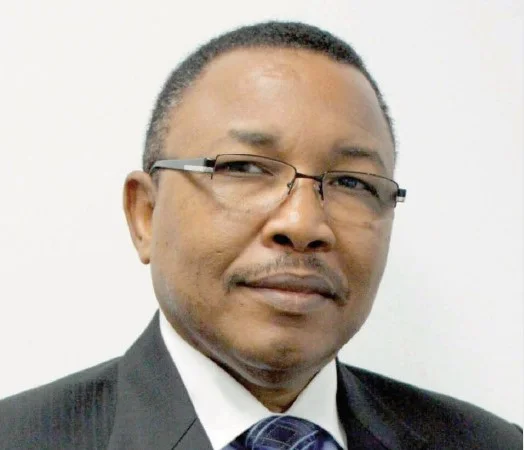
Former Sudanese Foreign Minister Omar Kamaruddin (Archive photo)
Former Sudanese Foreign Minister Omer Gamareldin Ismail scorns both the Port Sudan and Nyala governments as illegitimate. In an exclusive interview with Radio Dabanga’s Editor in Chief, Kamal Elsadig, for our Plain Speaking programme broadcast on Friday, Gamareldin says: “This government in Port Sudan came about as a result of the first coup that preceded the war and continued during the war and its repercussions. As for the [Nyala] Founding Government, it also came about as a result of the war and did not come into being with a popular mandate. Therefore, both governments are illegitimate… These governments and other governments that may come into being at a later time, if they are not the governments of the Sudanese people and not mandated by them, they are considered illegitimate governments.”
‘Both governments did not come into being with a popular mandate, therefore, both governments are illegitimate…’ – Omer Gamareldin
As previously reported by Radio Dabanga, in July, the founding coalition announced the formation of a government based in Nyala, South Darfur, with Mohamed Hassan El Tawashi as Prime Minister, while RSF leader Dagalo (Hemedti) assumed the Presidency, win Abdelaziz El Hilu as his deputy. Members of the presidential council of the Founding Government, which is parallel to the Port Sudan government, were sworn in on Saturday in Nyala. The Founding Government was met with widespread regional and international rejection, with the African Peace and Security Council affirming its non-recognition of the authority, and the UN Security Council and the Arab League following suit.
‘Who will rule now? Will you rule over graves and corpses?’
In the latest exclusive interview, Omer Gamareldin Ismail, who served as acting Minister of Foreign Affairs in Abdallah Hamdok’s transitional government, stresses to Radio Dabanga Editor in Chief Kamal Elsadig that the formation of governments in Port Sudan and Nyala cannot take place in light of the war, adding: “The war must stop first, and then if the Sudanese accept, and of their own free will, that there be two governments under one country, as happened previously in the Naivasha Peace Agreement, this is possible and can be tried, but after the war stops.”
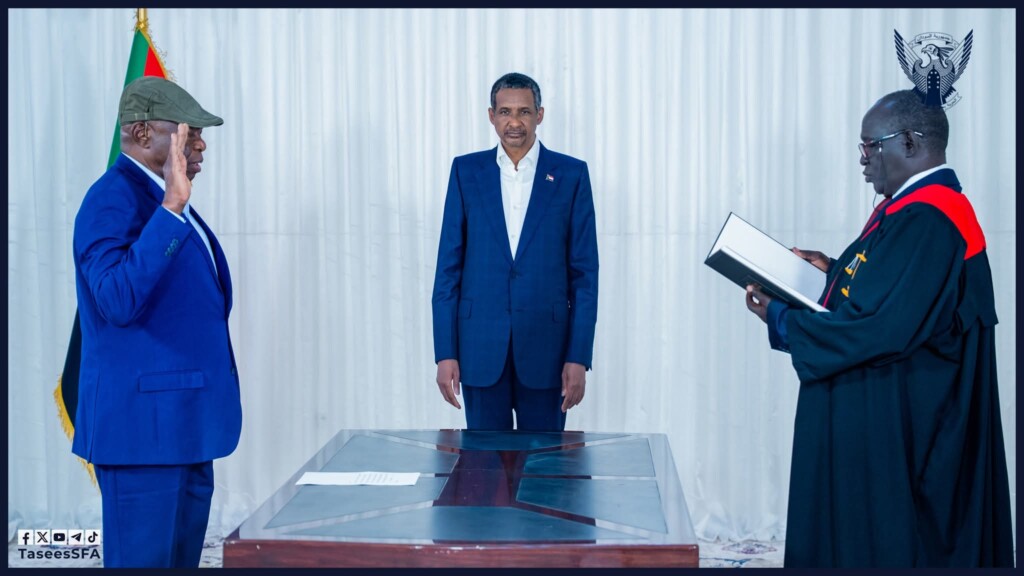
He stresses to Radio Dabanga that the establishment of governments while this ongoing war is ongoing and without stopping it completely is illogical. He adds: “Who will rule now? Will you rule over graves and corpses? This is an illogical question.” Gamareldin stresses in the interview with Radio Dabanga that what is required now is international action to stop this war, which has reached a stage that no longer threatens only the lives of the Sudanese but also threatens international peace and security.
Trump, the Quartet, and the absence of Sudanese representation
He explains that this much-needed international action today has several scenarios, including President Trump’s path through the Quartet, which includes, in addition to the United States, Saudi Arabia, Egypt and the UAE, to stop the war and achieve peace in Sudan.
He explains that this Quartet path needs to be activated now after its first meeting, scheduled for July 29, was cancelled for various reasons stated at the time. He explains that this path is highlighted by the fact that it includes countries that are active in the region and are the most affected or interfering in Sudanese affairs and its ongoing war.
He stresses that this track, which needs to be activated, represents external pressure that forces both warring parties and their supporters to stop fighting immediately. However, he points out that there is a real problem facing the American-Egyptian-Saudi-Emirati Quartet track to stop the war.
‘It is absolutely necessary to have real representation of the Sudanese to ensure an effective and immediate cessation of the war…’
He explains that the problem lies in the lack of any representation of the government, the Rapid Support Forces (RSF), or the civilian side in this track. He says that the lack of this Sudanese representation in this track makes even if an agreement is reached to stop the war, it will be based on dictation, threats, intimidation, or promises, and is not applicable, sustainable, and liable to explode at any time.
In this regard, he calls for the necessity of having real representation of the Sudanese in this track (regardless of whether we agree or not with the government in Port Sudan or the establishment of the RSF or the civilian forces or the number participating, but it is absolutely necessary to have real representation of the Sudanese to ensure an effective and immediate cessation of the war).
Alliance of those who want to stop the war
Regarding how to address the presence of Sudanese representation in the Quartet track to stop the war, given the differences and divisions among the various Sudanese parties without a minimum level of consensus between them, Gamareldin, says in the interview with Radio Dabanga that this is possible “through an alliance of actors who wish to attend, regardless of their affiliation to this war or not. What is important is to stop this war now and immediately, and then we will discuss each incident.”
‘We do not have time to waste. We now have a worsening humanitarian tragedy that threatens the existence of the nation as an entity…’
He stresses that this international and regional movement is currently missing the Sudanese from the three spectrums (the government, the founding coalition led by the RSF, and the civilian forces in its path). He continues, “Any number that comes from the three Sudanese spectrums, let them make peace and move forward, after which others will follow them.” He adds, “We do not have time to waste. We now have a worsening humanitarian tragedy that threatens the existence of the nation as an entity.”
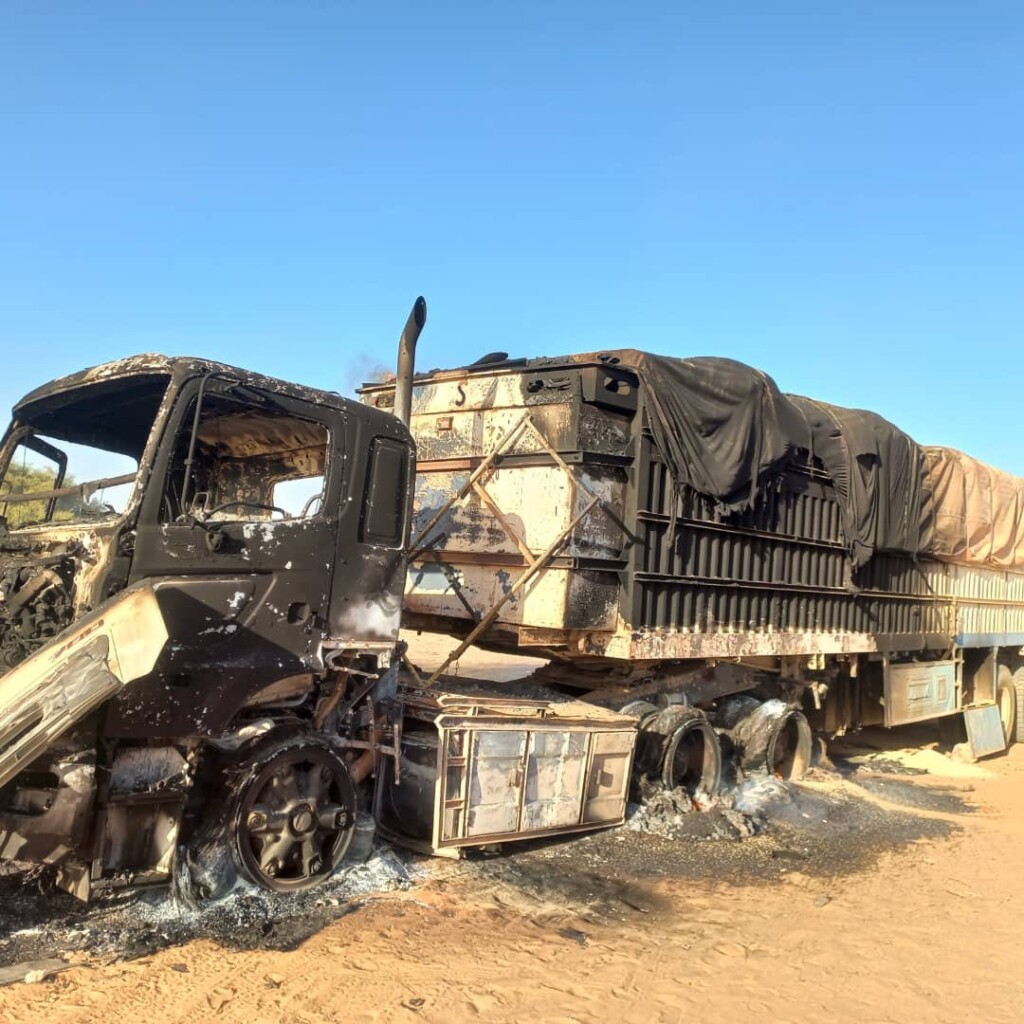
Activating sanctions against individuals and entities and cutting off foreign support
Regarding the repeated international and UN calls for a ceasefire and a truce to deliver aid and end the famine in Darfur and Kordofan, Gamareldin stresses that what is now required is for the Quartet, led by the US, and other international actors to work more effectively with the Sudanese to stop the war and pressure both parties by all possible means and methods to force them to stop fighting and cease fire immediately.
To achieve this goal, he also calls for activating and strengthening the sanctions previously imposed on individuals and entities calling for war and its continuation, saying, “These sanctions must be multiplied tenfold on individuals and entities supporting the war.” Gamareldin also calls for cutting off the support of external parties and countries that contribute to violence and war in Sudan, regardless of who these parties are, who support and assist the two sides – the army and the RSF – from these countries.
In this regard, Gamareldin also calls for comprehensive regional and international support that includes all the powers present in the region and the international community that are keen to stop this war, which has become a threat to international peace and security, and to stop the famine currently taking place in El Fasher, Darfur and Kordofan, and the tragic humanitarian situation that he says has begun to threaten the very existence of Sudan and the Sudanese people inside.
Famine, cholera, and the siege of El Fasher
UNICEF reports in a press release last week that at least 600,000 people—half of them children—have been displaced from El Fasher and surrounding camps in recent months. And within the city, an estimated 260,000 civilians, including 130,000 children, remain trapped in dire conditions in El Fasher, cut off from aid for more than 16 months. The United Nations has described the humanitarian catastrophe in Sudan as one of the world’s largest, with 30 million people in need of emergency assistance, including 638,000 people suffering from catastrophic hunger conditions.
‘The deteriorating humanitarian situation, especially in El Fasher and Kordofan, is tragic…’
In Friday’s interview with Radio Dabanga, Gamareldin describes the deteriorating humanitarian situation in Darfur, especially in El Fasher and Kordofan, as tragic. He says that the continued fighting and targeting of civilians by both sides of the war, in addition to the interruption of aid and its failure to reach those in need in a timely and appropriate manner, have led to an increase in the rates of famine, cholera and infectious diseases.
Gamareldin says that the onset of autumn and the heavy rains that fell this year led to the closure of roads, in addition to other remaining roads where the warring forces from both sides are deployed, targeting civilians and their gathering places. He explains that the situation in Darfur, especially the city of El Fasher, which has been under siege for more than a year, has led to the non-arrival of aid, and even the simple remaining aid has become non-existent as a result of this siege, which has forced the city’s residents to resort to eating animal feed (ambaz).
He explained that the ongoing siege on the city of El Fasher, as a centre for trade and administration of other areas in North Darfur, has led to the creation of problems in the local economy and has doubled the suffering and famine. Gamareldin refers to other points that he says have doubled the extent of the suffering of civilians, famine, and malnutrition in North Darfur. This is represented by the aerial bombardment of the areas of El Koma, El Maliha, Nyala and others, in addition to targeting innocent civilians and their markets, which has also led to the exacerbation of the famine.
‘The situation in Kordofan is no better than in Darfur, where fighting and extreme violence continue…’
Violence in North Kordofan, Kadugli and Dilling under siege
Regarding the situation in Kordofan, Gamareldin says that the situation in Kordofan is no better than in Darfur, where fighting and extreme violence continue in the areas of El Khawi, En Nahud, El Obeid and the surrounding villages in North Kordofan, reaching the areas of Kazgil and Deribat in the south, and in the north until they reach the areas of Bara and Rahid El Nuba.
He laments that this situation has led to the displacement of thousands of civilians in North Kordofan, while the cities of Kadugli and Dilling in South Kordofan are still under siege and direct threat, which has led to the displacement of large numbers of civilians.
*Omer Gamareldin Ismail is a former Acting Minister of Foreign Affairs in Sudan. He took office in July 2020 after Cabinet reshuffle by the then Prime Minister Abdallah Hamdok.









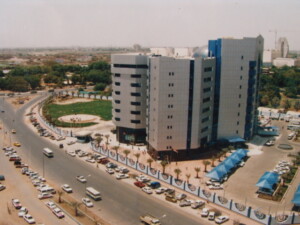
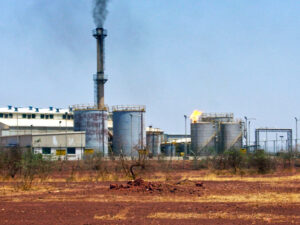

 and then
and then